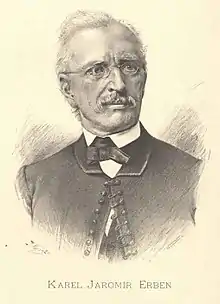Karel Jaromír Erben
Karel Jaromír Erben (Czech pronunciation: [ˈkarɛl ˈjaromiːr ˈɛrbɛn]; 7 November 1811 – 21 November 1870) was a Czech folklorist and poet of the mid-19th century, best known for his collection Kytice (Czech: Bouquet), which contains poems based on traditional and folkloric themes.
Karel Jaromír Erben | |
|---|---|
 Portrait of Karel Jaromír Erben by Jan Vilímek | |
| Born | 7 November 1811 Miletín, Austria |
| Died | 21 November 1870 (aged 59) Prague, Austria-Hungary |
| Resting place | Olšany Cemetery |
| Occupation | folklorist, poet, archivist |
| Nationality | Czech |
| Literary movement | Romanticism |
| Notable works | Kytice |
| Spouse | Barbora Mečířová |
He also wrote Písně národní v Čechách (Folk Songs of Bohemia) which contains 500 songs and Prostonárodní české písně a říkadla (Czech Folk Songs and Nursery Rhymes), a five-part book that brings together most of Czech folklore.

Biography
He was born on 7 November 1811 in Miletín near Jičín. He went to college in Hradec Králové. Then, in 1831, he went to Prague where he studied philosophy and later law. He started working in the National Museum (Národní muzeum) with František Palacký in 1843. He became editor of a Prague's newspaper in 1848. Two years later, in 1850, he became archives' secretary of the National Museum. He died on 21 November 1870 of tuberculosis.
He was member of the Czech National Revival, and politically he was also a sympathizer of Illyrian movement and Russian Slavophilia for entrenched populations of Slavs in other parts of the world.
As practitioner of his ideals, he published Sto prostonárodních pohádek a pověstí slovanských v nářečích původních (One Hundred Slavic Folk Tales and Legends in Original Dialects), also known by its subtitle Čitanka slovanská (Slavic Reader), that was influenced by the Grimms' collection of fairy tales.[1][2] It included such pieces as tale No. 2, "Dlouhý, Široký a Bystrozraký" ("Long, Broad and Sharpsight", translated into English by Albert Henry Wratislaw).[3][4] The entire volume was translated by W. W. Strickland, and eventually published as Panslavonic Folk-lore in 1930.[2]
He is also considered an important poet of the Czech literary Romanticism in the mid-19th century, with his collection of a dozen literary ballads entitled Kytice z pověstí národních (A Bouquet of Folk Legends, 1853).[5]
Selected works
- Písně národní v Čechách (Folk Songs of Bohemia) (1842–1845); contains 500 songs
- Kytice z pověstí národních (A Bouquet of Folk Legends) (1853, expanded edition 1861) (English edition, 2012)
- Sto prostonárodních pohádek a pověstí slovanských v nářečích původních: čitanka slovanská s vysvětlením slov ("One Hundred Slavic Folk Tales and Legends in Original Dialects: a Slavic Reader with Vocabulary", 1865)[6]
- Vybrané báje a pověsti národní jiných větví slovanských (Selection of Folk Tales and Legends from Other Slavic Branches) (1869)
- Prostonárodní české písně a říkadla (Czech Folk Songs and Nursery Rhymes) (1864); 5-part collection of Czech folklore
- České pohádky (Czech Fairy Tales)
Explanatory notes
References
| Wikisource has original works written by or about: Karel Jaromír Erben |
| Wikimedia Commons has media related to Karel Jaromír Erben. |
- Citations
- Klíma (1984), p. 122.
- Zipes (2013), pp. xxxi–xxxii.
- Klíma (1984), pp. 122–123.
- Zipes (2013), pp. 488–495.
- Murray, Christopher John (2013), Encyclopedia of the Romantic Era, 1760-1850, Hackett Publishing, p. 244
- Sto prostonarodních pohádek a pověsti solvanských v nářečích původních: čitanka slovanská s vysvětlením slov (in Czech). I.L. Kober. 1865-01-01.
- Bibliography
- Klíma, Josef R. (1984), Ranke, Kurt (ed.), "Traditional Slovak Folktales", Enzyklopädie ds Märchens, Berlin and New York: de Gruyter, 4, pp. 122–124
- Zipes, Jack (2013), The Golden Age of Folk and Fairy Tales: From the Brothers Grimm to Andrew Lang, Indianapolis: Hackett Publishing, pp. xxxi–xxxii
- Profile by School of Modern Languages and Cultures at University of Glasgow
External links
- Works by or about Karel Jaromír Erben at Internet Archive
- Works by Karel Jaromír Erben at LibriVox (public domain audiobooks)

- About English translation on Radio Prague